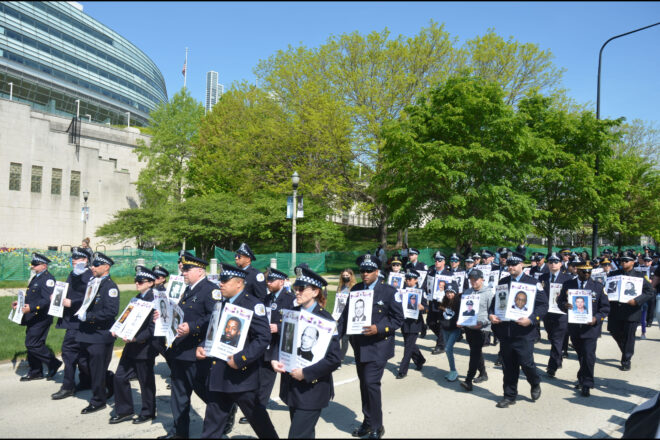This past January, the Task Force on Missing and Murdered Chicago Women (MMCW) Act took effect in Illinois. The act was passed by the Illinois General Assembly in June of 2022. The legislation created a task force seeking to examine the issue of missing and murdered women in Chicago. Under the act, the Illinois Association of Chiefs of Police (ILACP) was among the agencies and organizations authorized to nominate a task force member. The ILCAP nominated former Chicago Police Deputy Chief Thomas Lemmer to serve on the task force. In April, Executive Director Delrice Adams, from the Illinois Criminal Justice Information Authority (ICJIA), formally approved Lemmer’s appointment. The first session of the task force was held on 24 May 2023.
Estimated reading time: 5 minutes
Chicago Has a Violence Problem
Without question, Chicago has a problem with violence, which grew in 2020 and 2021. There was a reduction in the level of homicide in Chicago during 2022. However, the level of violence in the city remains above where it was in just 2019. The drivers of that violence and the victims of violence in Chicago are more typically male teens and young men.
Chicago police have long asserted that each missing person and murder case is fully investigated. Even as detectives work to solve every case, the data show that murder risk is not evenly distributed. Not by season, day of the week, nor time of day. The risk of being murdered is not the same geographically, nor by demographics. This is true both nationally, and within the City of Chicago.
Some community activists have expressed their concerns that missing and murdered women get lost in the mix. The MMCW Task Force has been formed to examine the issue more closely. Illinois State Senator Mattie Hunter was a sponsor of the task force legislation. Hunter, now also on the task force, argued:
“When a loved one goes missing or is murdered, that takes a huge toll on a family, and that is a pain that will never go away. That pain is magnified when the family is left with no answers, which is why we need a task force to offer guidance for how to handle these cases better.”
More on the MMCW Task Force
Under the state statute, the task force is to be comprised of the following. Four state legislators, two each from the Illinois Senate and Illinois House of Representatives. Two members with a law enforcement background. One or more members from the judiciary, a prosecutor’s office, attorneys working in juvenile court, the Cook County Medical Examiner’s Office, or the Department of Public Health. Two members from organizations supporting victims of violence. Four or more members from organizations: (a) providing legal services to Chicago women and girls; (b) providing advocacy or counseling services for Chicago women and girls who were victims of violence; (c) providing healthcare services to Chicago women and girls; (d) representing victims of sexual assault; (e) from a women’s health organization or agency; or (f) a Chicago woman who is a survivor of gender-related violence.
Task Force Reporting
Beginning in December 2024, and each year thereafter, the MMCW Task Force must prepare an annual report. Through the report, the task force is to provide guidance on addressing the underlying issues. The report is presented to the governor and Illinois General Assembly. Quoting from the act, 20 ILCS 4119/10, the task force is to examine and report on:
(1) the systemic causes behind violence that Chicago women and girls experience, including patterns and underlying factors that explain why disproportionately high levels of violence occur against Chicago women and girls, including underlying historical, social, economic, institutional, and cultural factors that may contribute to the violence;
(2) appropriate methods for tracking and collecting data on violence against Chicago women and girls, including data on missing and murdered Chicago women and girls;
(3) policies and institutions such as policing, child welfare, medical examiner practices, and other governmental practices that impact violence against Chicago women and girls and the investigation and prosecution of crimes of gender-related violence against Chicago residents;
(4) measures necessary to address and reduce violence against Chicago women and girls; and
(5) measures to help victims, victims’ families, and victims’ communities prevent and heal from violence that occurs against Chicago women and girls.
Task Force Members as of May 2023
The work to form the task force has been slower than expected. The first session was held this past Wednesday, and ICJIA organizing efforts continue. Currently, the task force is comprised of the following members: Senator Mattie Hunter; Representative Kambium Buckner; Representative Tony McCombie (House Minority Leader); Major Abigail Keller, from the Illinois State Police; Deputy Chief Thomas Lemmer, retired from the Chicago Police Department (CPD) and representing the ILACP; Lisa Masinter, from the Illinois Department of Public Health; Rebeca Perrone, from the Cook County Medical Examiner’s Office; as well as Verda Bhatti, Margaret Duval, Jennifer Greene, Amanda Pyron, Scheherazade Tillet, Carrie Ward, and Cristina Villarreal, from various service providing organizations, and Teresa Smith from the community.
Lemmer on the the Task Force
The ILACP is the largest association of police executives in Illinois. The group is a leading voice in addressing the state’s public safety challenges. In reflecting on having received the ILACP’s nomination to serve on the MMCW Task Force, Lemmer called it “an honor.”
Lemmer brings more than forty years of experience in the field of public safety to the task force. Additionally, his academic background includes bachelor’s and master’s degrees, as well as experience as an undergraduate adjunct professor in the field of Criminal Justice. Lemmer was previously CPD’s head of the Research and Development Division, commander of its Youth Investigations Division, and the deputy chief that directed the department’s management accountability processes.
He remarked, “I remain fully committed to advancing public safety,” and he expressed concern for the city he served for more than three decades. He pledged: “I will do my best to move the task force in a positive, useful, direction.” He added: “We are very early in this process. For the task force to truly address these violence concerns, it must be more than a political photo-op.”
We are interested in your thoughts, and invite you to comment below.



Congratulations to DC Lemmer on this prestigious appointment. It is a testament to his skill and qualifications. Hopefully other members of the task force will be as committed and dogged in their pursuit of answers. Best of luck.
Thank you. I greatly appreciate your support and confidence. Truth will be essential.